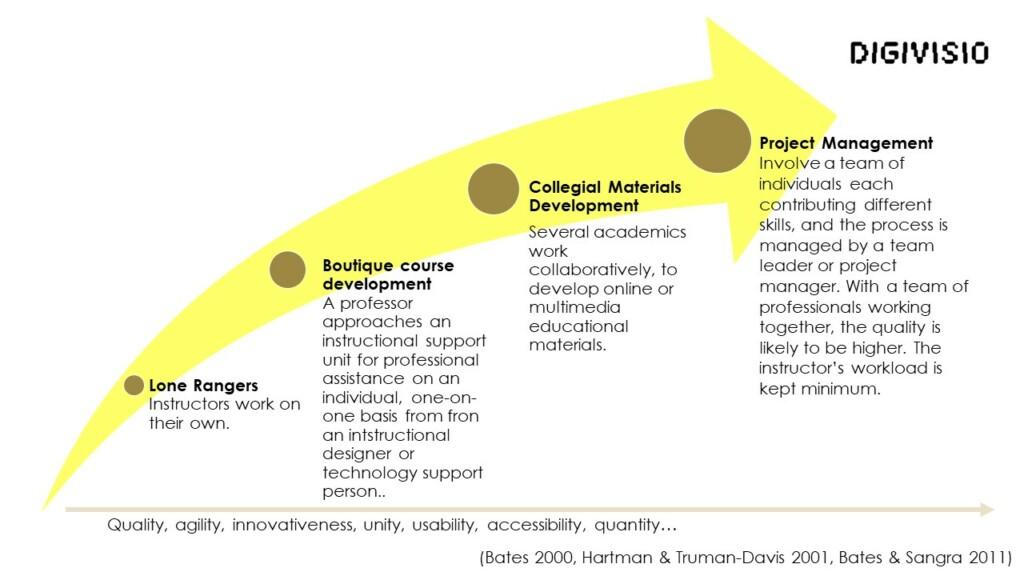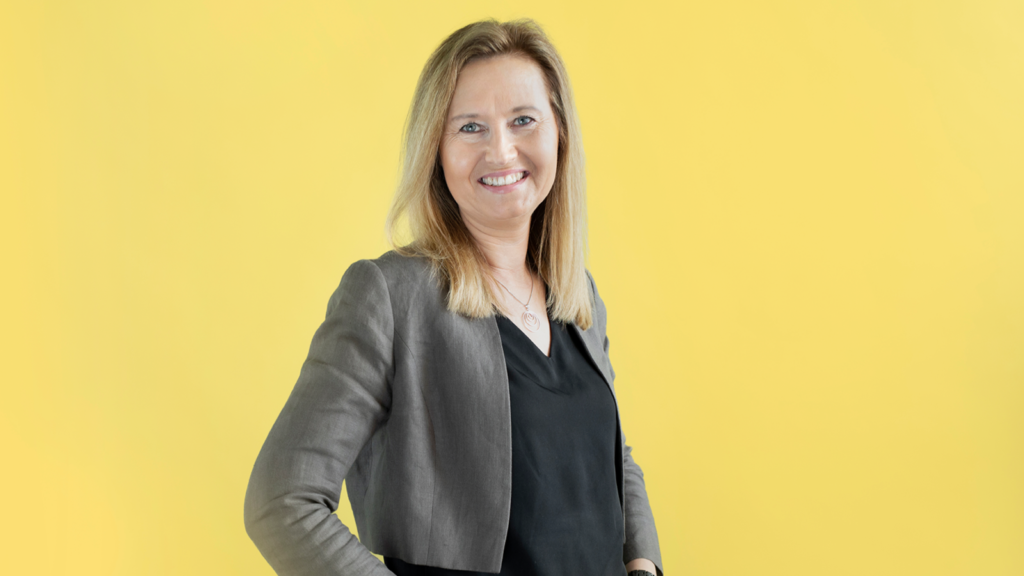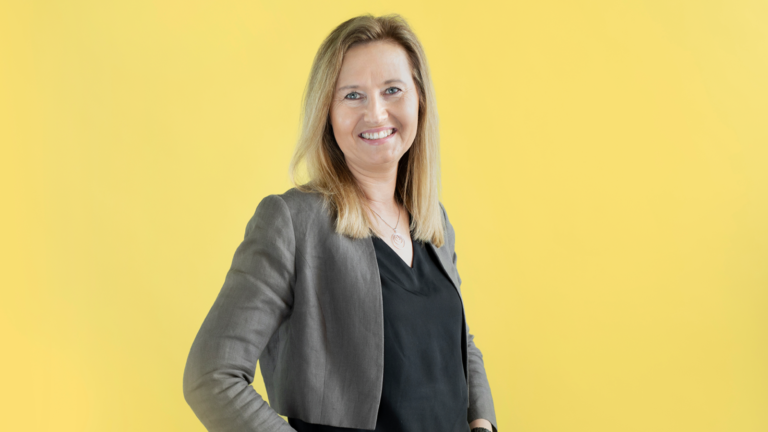As part of the pilot programme for digitally supported studies in higher education, institutions worked on reorganising their internal structure and processes to advance the efficiency of e-learning production. The initial interviews expressed the need to transition from handmade processes to scalable production methods. We are moving towards a team-based and open operating culture.
Production processes for e-learning ensure consistent and equal pedagogical quality, usability and accessibility across different content and areas of study. Teachers find that having consistent practices, processes and templates for learning platforms simplifies their work, allowing them more time to focus on planning their teaching and supporting students.
Master workspaces and common implementation templates as examples
In the pilot workshops, Laurea and Haaga-Helia presented their examples for uniform practices.
Master workspaces at Laurea make teachers’ work easier
Laurea’s Master workspaces already cover two-thirds of the teaching offered at Laurea. Master workspaces form a library of joint pedagogical solutions for specific areas of study.
Part of the yearly management of degrees at Laurea consists of the creation and updating of workspaces. Working hours have been allocated to the creators of workspaces, and feedback is collected in a systematic manner from both students and teachers. Especially new teachers value the Master workspaces, and they are already expecting them, Tuija Marstio and Anssi Mattila described at the workshop in November.
For instance, the Master on research methods facilitates teachers’ work by providing diverse content on various methods. The workspace feedback form brings the developers and teachers of the Master workspace closer together. From the learner’s point of view, studies completed in Master workspaces appear to be uniform and of consistent quality.
At Haaga-Helia, implementation templates follow the quality criteria for e-learning
At Haaga-Helia, common key competences are put into practice using a shared implementation template that complies with the quality criteria for e-learning and focuses on the implementation of study units at Haaga-Helia. New virtual study units are planned in accordance with the development process and revised on the basis of course feedback before implementation.
The implementation templates are created in collaboration between 2 to 3 teachers and e-learning mentors. In addition, teachers also have access to content downloaded from Teams. At Haaga-Helia, the management staff and supervisors of competence areas also play a key role in the transition to uniform practices, and they are responsible for tasks such as resourcing e-learning mentors and teachers. Quality reviews are carried out at Haaga-Helia, especially for the courses added to the Opin.fi service, Päivi Rajaorko said at the workshop in December.
Pilot universities worked on their own practices
As one of the 2.0 pilot universities, Turku University of Applied Sciences modelled the pedagogical guidelines, a learning platform template and personal guidance to support teachers in the planning of a nonstop online course. This led to the development of a new working model for creating e-learning content, alongside a clearer service pathway for learners at the Open University of Applied Sciences.
At Kajaani University of Applied Sciences, the uniform and clear structure of the learning environment is promoted on KAMK’s Reppu Moodle and on the Edukamu platform developed by KAMK. In the latter, the teacher receives assistance from their own team when planning and creating studies. Each study unit at the open UAS is evaluated, and the quality assessment places emphasis on functional description data and the accessibility of content. Consistent use of quality criteria is facilitated by means of a pedagogical support website, production support and digital mentors as well as internal training.
RDI projects to incorporate learning design
Each higher education institution is responsible for the quality of the courses available in the Opin.fi service. To facilitate the production of e-learning content, the 2.0 pilot universities Savonia University of Applied Sciences and Karelia University of Applied Sciences produced guidelines for RDI project actors who do not all have pedagogical competence. Projects need support and guidance already at the application stage in order to identify all costs related to content production and to be able to schedule the production of e-learning content in a realistic manner.
Savonia University of Applied Sciences came to the realisation that 32% of the staff at the university work in RDI projects, and there is a need for clear guidelines and support services to promote the design of content produced in RDI projects for continuous learners. Karelia University of Applied Sciences, in turn, wanted to develop its internal processes in order to make the material produced in RDI projects more visible and accessible in one place, at EduKarelia.
At the Digipedagogiikka joukkuepelinä [E-learning as a Team Sport] event on 12 March, Jenni Laaksonen presented education available in the hydrogen sector, produced in cooperation between the FITech network and 70 hydrogen companies. The sector will require hundreds of thousands of experts in the future. Through cooperation between FITech and the hydrogen cluster, fragmented hydrogen education has now been compiled into a free training resource for engineers to advance their expertise and for upper secondary school students to have a taster of the field.
Learner-centricity challenges digital pedagogy
New types of content and implementation methods suitable for continuous learners pose challenges for the production of digitally supported learning content at higher education institutions. Micro-learning, open learning and the design of RDI contents for learners require the enhancement of staff competence at higher education institutions.
Jamk University of Applied Sciences responded to the challenges by organising a one-year programme in pedagogical competence development for all its teachers. The development programme strengthened the shift from the planning of teaching towards designing learner-centred learning processes.
The higher education institutions of Lapland improve the learner’s experience by outlining the learner’s path as a whole. Systemic competence development fosters collaboration between actors and enhances the enterprise architecture. Accessible systems and well-functioning integrations result in a comprehensible and seamless experience for learners. This is not all that easy, but we will learn together along the way, Tanja Rautiainen describes the experiences at Lapland universities.
The renewal of operating methods is ongoing
Continuous learners’ and society’s expectations for higher education are growing, yet there are no additional resources available. We can access new content from RDI projects via open learning and by functioning as a network of higher education institutions, if we adopt a fresh perspective on structures, collaboration and internal processes within higher education institutions.

The creation of e-learning material has transitioned from individual teacher efforts to collaborative teamwork, maximising resources and resulting in equal, high-quality education and content.
Successful digitalisation requires continuous renewal of the operating culture, structures and processes. The conditions will change at an exponential rate in the future, and the most recent driver of change is the role that augmented intelligence plays at the macro and micro levels of education. The culture of experimentation and turning failures into learning situations increase the organisation’s competence according to the 70:20:10 model, as 70% of learning occurs through co-development with others, 20% occurs during solitary self-reflection and 10% in training.
Each organisation is responsible for developing the internal processes within the higher education institution, updating the structures and implementing the changes in actors. It is a good idea to familiarise yourself with the examples from other higher education institutions and learn from them, even if they may not be directly applicable to your own context. The examples provide inspiration for the management of pedagogy at higher education institutions, for leading a community of pedagogical experts and for pedagogical management.
The experiences gained from the pedagogical development projects at the pilot universities have been shared at the E-learning as a Team Sport event, and the development of internal processes continues in the daily life of the universities. The E-learning Studios will be revisiting a couple of topics in the autumn.
All posters created in the 2.0 pilot universities’ pedagogical development projects can be found on eDuuni and on the Digivisio website, and further information can be obtained from the contact persons listed on the posters.

Satu Hakanurmi
E-learning expert
